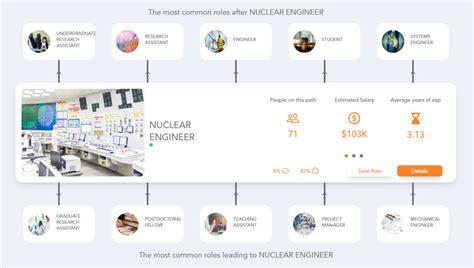Introduction

In the era of growing global energy demand and climate concerns, nuclear engineering has emerged as a critical field that offers immense potential for addressing these challenges. Nuclear engineers play a vital role in designing, building, and operating nuclear power plants, ensuring the safe and efficient generation of electricity with minimal environmental impact.
With the increasing adoption of nuclear technology worldwide, there is a burgeoning demand for skilled nuclear engineers. If you possess a strong interest in science, technology, and problem-solving, a career in nuclear engineering offers numerous opportunities for personal and professional growth, while contributing to the advancement of society.
Types of Nuclear Engineering Positions
The field of nuclear engineering encompasses a wide range of specialized positions, each with its unique responsibilities. Some of the most common types of nuclear engineering jobs include:
1. Reactor Design and Analysis:
- Design and analyze nuclear reactors, fuel assemblies, and nuclear fuel cycles
- Conduct safety analysis and assess potential risks associated with nuclear power plant operations
- Optimize reactor performance to maximize efficiency and reduce waste generation
2. Nuclear Safety and Licensing:
- Ensure compliance with regulatory standards and safety requirements for nuclear facilities
- Conduct safety reviews and assessments to identify potential hazards and mitigate risks
- Obtain and maintain operating licenses for nuclear power plants
3. Nuclear Materials and Fuel:
- Develop and characterize nuclear materials used in reactors
- Investigate the behavior of nuclear fuels under various operating conditions
- Design and evaluate fuel management strategies to optimize reactor performance and safety
4. Nuclear Waste Management:
- Develop and implement strategies for the storage, transportation, and disposal of radioactive waste
- Design waste treatment and disposal facilities
- Conduct environmental assessments and monitoring to ensure public safety
5. Radiation Protection:
- Implement and enforce radiation protection measures to minimize exposure to radiation
- Design and operate radiation shielding systems
- Monitor radiation levels and train workers on radiation safety procedures
6. Nuclear Instrumentation and Control:
- Design and maintain instrumentation and control systems for nuclear power plants
- Develop software and hardware to monitor and control reactor operations
- Ensure the reliable and safe operation of nuclear facilities
Education and Training
A strong academic foundation is essential for a successful career in nuclear engineering. Typically, a bachelor’s degree in nuclear engineering or a related field is required. Some positions may also require a master’s degree or doctorate.
In addition to formal education, hands-on experience in research or industry is highly valued. Many universities and research institutions offer undergraduate and graduate research opportunities that allow students to work on cutting-edge nuclear engineering projects.
Skills and Qualifications
Effective nuclear engineers possess a combination of technical expertise, communication skills, and problem-solving abilities. Some of the essential skills and qualifications for nuclear engineering positions include:
- Strong foundation in nuclear physics, mathematics, and engineering principles
- Knowledge of nuclear reactor design, safety, and waste management
- Analytical and problem-solving skills
- Excellent written and verbal communication skills
- Ability to work independently and as part of a team
- Detail-oriented and safety-conscious
Career Outlook
The outlook for nuclear engineering positions is expected to be strong in the coming years. The increasing demand for nuclear power and the growing need for advanced nuclear technologies have created numerous job opportunities in this field.
According to the U.S. Bureau of Labor Statistics, employment of nuclear engineers is projected to grow by 10% from 2020 to 2030, faster than the average for all occupations. This growth is primarily driven by the need to replace aging nuclear power plants and invest in new nuclear technologies.
Compensation
Nuclear engineers earn competitive salaries that vary depending on their experience, education, and location. According to the National Association of Colleges and Employers (NACE), the average starting salary for nuclear engineering graduates in 2023 was $77,900. With experience, nuclear engineers can advance to higher-level positions with even greater earning potential.
Applications
Nuclear engineering has a wide range of applications, including:
- Power Generation: Nuclear power plants generate electricity without emitting greenhouse gases, contributing to global climate change mitigation.
- Medical Diagnostics and Treatment: Nuclear medicine utilizes radioactive isotopes for diagnosis and treatment of various diseases.
- Industrial Applications: Nuclear techniques are used in a variety of industries, including food sterilization, quality control, and material analysis.
- Space Exploration: Nuclear power systems provide energy for deep space missions and human exploration of the moon and Mars.
- Forensic Science: Nuclear techniques are used to identify and analyze radioactive materials for crime scene investigations and homeland security applications.
Innovation and Emerging Technologies
The field of nuclear engineering is constantly evolving, driven by technological advancements and the need for more efficient and safer nuclear technologies. Some of the emerging technologies and areas of innovation in nuclear engineering include:
- Advanced Reactor Designs: New reactor designs aim to improve safety, reduce waste generation, and increase efficiency.
- Small Modular Reactors (SMRs): SMRs are smaller and more flexible than traditional nuclear reactors, making them suitable for a wider range of applications.
- Thorium-Based Nuclear Systems: Thorium-based nuclear fuels are being explored as a more sustainable and proliferation-resistant alternative to uranium-based fuels.
- Nuclear Fusion: Nuclear fusion is a promising technology that has the potential to provide a virtually limitless source of clean energy.
- Artificial Intelligence (AI): AI is being integrated into nuclear engineering systems to enhance safety, optimize operations, and improve decision-making.
Conclusion
Nuclear engineering is a rewarding and impactful career path that offers opportunities to contribute to the advancement of society while addressing critical global challenges. With a strong academic foundation, technical expertise, and a commitment to safety, nuclear engineers have the potential to make a significant difference in the world. The field is poised for continued growth in the coming years, providing numerous opportunities for personal and professional development.
